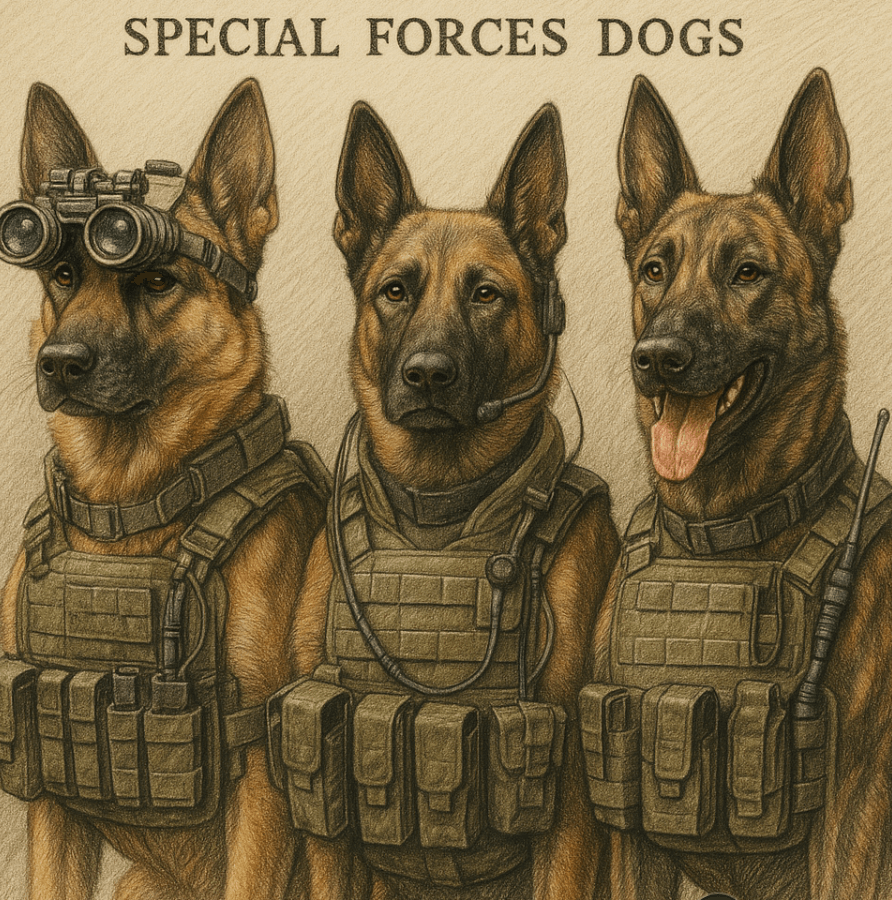Special Forces Dogs: The Unsung Heroes of Military Operations
Special forces dogs, often referred to as military working dogs (MWDs), are an integral part of elite military units around the world. These highly trained canines serve alongside soldiers in some of the most dangerous and demanding environments, showcasing unparalleled loyalty, intelligence, and courage.
From detecting explosives to tracking enemies, these four-legged warriors play a critical role in ensuring mission success and saving lives. But what makes these dogs so special? How are they trained, and what challenges do they face in the field? In this blog post, we’ll explore the fascinating world of special forces dogs, shedding light on their incredible abilities, contributions, and the bond they share with their handlers.
Key Roles of Special Forces Dogs in the Field
Special forces dogs are deployed for a wide range of missions, each requiring unique skills and training. Their versatility and adaptability make them invaluable assets in high-stakes operations.
Explosive Detection:
These dogs are trained to sniff out hidden explosives, including IEDs (improvised explosive devices), protecting troops and civilians from potential threats.Tracking and Reconnaissance:
With their keen sense of smell and agility, special forces dogs excel at tracking enemy combatants and gathering intelligence in challenging terrains.Patrol and Guard Duty:
They provide security by patrolling perimeters and alerting handlers to any suspicious activity, acting as the first line of defense.Search and Rescue:
In disaster zones or combat scenarios, these dogs locate missing personnel, often navigating rubble and other hazardous conditions.Apprehension and Attack:
Trained to subdue suspects or enemies, special forces dogs use their strength and speed to neutralize threats when necessary.
The diverse skill set of these dogs ensures they remain indispensable members of military teams, capable of handling virtually any challenge.
Breeds Commonly Used as Special Forces Dogs
Not all dogs are suited for the rigors of military life. Special forces dogs are typically selected from breeds known for their intelligence, endurance, and trainability. Here are some of the most common breeds used in elite units.
Belgian Malinois:
Renowned for their athleticism and work ethic, Belgian Malinois are the top choice for many special forces units worldwide.German Shepherd:
Known for their versatility and protective instincts, German Shepherds have been trusted companions in military operations for decades.Dutch Shepherd:
This lesser-known breed is prized for its resilience and adaptability, making it ideal for specialized missions.Labrador Retriever:
Often used for detection roles, Labradors are friendly yet highly focused, excelling in scent-based tasks like bomb and drug detection.Doberman Pinscher:
With their speed and alertness, Dobermans are occasionally utilized for guard and patrol duties in high-risk areas.
These breeds embody the qualities needed to thrive in the demanding world of special forces operations.
Check this guide 👉Understanding Military Dog Commands: Best 7 Expert Tips!
Check this guide 👉Police Dog Breeds: Best 7 Expert Tips!

Skills of Special Forces Dogs | Challenges Faced by Military Working Dogs |
|---|---|
Explosive and narcotics detection | Exposure to extreme weather conditions |
Tracking and reconnaissance capabilities | Risk of injury or death in combat zones |
Patrol and perimeter security | Separation anxiety during deployments |
Search and rescue missions | Physical strain from carrying gear |
Apprehension and attack training | Retirement adjustment after active service |
Training Process for Special Forces Dogs
The rigorous training process is what sets special forces dogs apart from ordinary pets. Their preparation begins early and focuses on honing both physical and mental abilities.
Early Socialization:
Puppies are exposed to various environments, people, and stimuli to build confidence and adaptability.Obedience Training:
Basic commands form the foundation of their education, ensuring they respond reliably under pressure.Specialized Skill Development:
Depending on their future role, dogs undergo advanced training in areas like scent detection or apprehension techniques.Physical Conditioning:
Daily exercise routines include running, climbing, and obstacle courses to maintain peak fitness levels.Bonding with Handlers:
A strong relationship between dog and handler is crucial for effective teamwork and communication in the field.
This intensive training equips special forces dogs to perform their duties with precision and reliability.
The Bond Between Handlers and Special Forces Dogs
The partnership between a handler and their special forces dog is one of mutual trust and respect. This bond is not only essential for mission success but also provides emotional support in challenging situations.
Shared Experiences:
Handlers and dogs spend countless hours together, building a deep connection through shared experiences in training and combat.Nonverbal Communication:
Over time, handlers learn to interpret subtle cues from their dogs, allowing seamless coordination during missions.Emotional Support:
In stressful environments, the presence of a loyal canine companion can boost morale and reduce feelings of isolation.Post-Mission Care:
Handlers ensure their dogs receive proper rest, medical attention, and affection after completing demanding tasks.Lifelong Commitment:
Many handlers adopt their dogs upon retirement, continuing the bond beyond their military careers.
This extraordinary relationship underscores the importance of teamwork in achieving mission objectives.
Common Misconceptions About Special Forces Dogs
Despite their prominence, several misconceptions surround special forces dogs. Clearing up these myths helps foster a better understanding of their true nature and capabilities.
They Are Aggressive All the Time:
While trained for combat scenarios, these dogs are disciplined and calm unless directed otherwise.Any Dog Can Be Trained for Special Forces:
Only specific breeds with the right temperament and physical attributes qualify for such demanding roles.Their Gear Is Just for Show:
Protective vests and harnesses serve practical purposes, enhancing safety and performance in the field.They Retire Early Due to Burnout:
Most dogs retire due to age-related factors rather than burnout, thanks to careful management of their workload.They Don’t Form Bonds with Handlers:
On the contrary, the handler-dog bond is one of the strongest aspects of their partnership.
Understanding the truth behind these misconceptions highlights the professionalism and dedication of special forces dogs.
Health Challenges Faced by Special Forces Dogs
While incredibly resilient, special forces dogs face numerous health challenges due to the intense demands of their jobs. Recognizing these risks allows for proactive care and support.
Joint and Muscle Injuries:
Frequent jumping and running put stress on joints, leading to conditions like arthritis or ligament tears.Heat Exhaustion:
Operating in hot climates increases the risk of dehydration and heatstroke, requiring constant monitoring.Psychological Stress:
Exposure to combat zones can lead to anxiety or PTSD-like symptoms, necessitating mental health interventions.Hearing Damage:
Loud explosions and gunfire may cause hearing loss over time, impacting their quality of life post-retirement.Parasites and Infections:
Deployments in remote areas expose dogs to diseases and parasites, requiring regular veterinary check-ups.
Addressing these health concerns ensures these brave animals remain healthy and happy throughout their service.
Ways to Support Retired Special Forces Dogs
After years of dedicated service, retired special forces dogs deserve our gratitude and care. There are several ways individuals and organizations can contribute to their well-being.
Adoption Programs:
Supporting adoption initiatives helps find loving homes for retired dogs, ensuring they enjoy a peaceful retirement.Donations to Charities:
Organizations dedicated to caring for retired military dogs rely on donations to provide medical care and rehabilitation services.Volunteering Your Time:
Assisting shelters or foster programs that care for retired dogs can make a significant difference in their lives.Advocacy and Awareness:
Raising awareness about the contributions of special forces dogs encourages broader community support.Providing Comfort Items:
Donating blankets, toys, or food to shelters caring for retired dogs improves their comfort and happiness.
By supporting these efforts, we honor the sacrifices made by these courageous canines and give back to those who served so selflessly.
Frequently Asked Questions About Special Forces Dogs
How long does it take to train a special forces dog?
Training typically lasts 1-2 years, depending on the specific skills required for their role.
What happens to retired military dogs?
Many retired dogs are adopted by their handlers or placed in loving homes where they can live comfortably.
Are special forces dogs treated like human soldiers?
Yes, they are considered valuable members of the team and receive medical care, food, and housing similar to human troops.
Can any dog become a military working dog?
No, only certain breeds with the right temperament and physical traits are selected for this demanding role.
Do special forces dogs wear protective gear?
Yes, they often wear vests designed to protect against bullets, shrapnel, and harsh weather conditions.
Honoring the Legacy of Special Forces Dogs
Special forces dogs are more than just animals—they are heroes who risk their lives alongside human soldiers to protect nations and save lives. Their unwavering dedication, unmatched skills, and unbreakable bond with their handlers make them irreplaceable members of military teams. As we honor their service, let us also recognize the sacrifices they make and ensure they receive the care and respect they deserve, both during and after their service. These incredible canines remind us that even in the toughest battles, loyalty and courage shine brightest.
Pandango Dog: Best 7 Expert Tips! – Discover the perfect mix of Poodle smarts and Dachshund charm, plus care, health, and training advice for this lovable hybrid.
Why Is My Cats Skin Pink? Best 7 Expert Tips! – Discover causes, signs, and solutions for pink skin in cats. Learn when to worry and how to keep your feline healthy.
Why Is My Dogs Skin Pink? Best 7 Expert Tips! – Discover causes, symptoms, and solutions for pink skin in dogs. Learn when to act and how to keep your pup healthy!
Understanding Cat Skin Colors: Best 7 Expert Tips! – Explore the science, patterns, and care behind feline skin colors for a healthier, happier cat.




